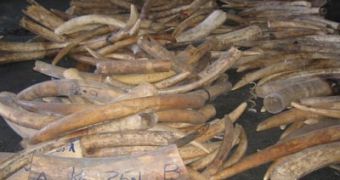What brings sexual success to an elephant also means its death by human hand, ever since antiquity: their ivory.
Now conservationists blame Asian mafias operating in Africa for the recent massive slaughter of elephants (particularly of Central African ones) for their ivory.
A recent research made by TRAFFIC, a wildlife trade-monitoring association run by WWF and the United Nations' World Conservation Union, detected the Democratic Republic of Congo (DRC), Cameroon and Nigeria as main sources of illegal ivory.
"Central Africa is currently hemorrhaging ivory, and these three countries are major conduits for trafficking illicit ivory from the region to international markets, particularly in Asia," stated lead author Tom Milliken, director of TRAFFIC's Africa program. Mainly, Chinese traffickers are behind the doubling of the size and number of large-scale ivory seizures.
Ivory seizures over a ton increased from 17 during 1989-1997 to 32 during 1998-2006, as revealed by data of 12,400 seizures from 82 countries. The researchers detected China as the main ivory demander, fueled through ports like Hong Kong, Macao, but also Taiwan, Thailand, Philippines and Japan.
"The growth in large-scale seizures coincides with a period of massively increased trade between Africa and China," said TRAFFIC's Richard Thomas, from Cambridge, England.
"These trade ties have made illegal ivory shipments much easier to set up. The fact that they are shifting such large quantities of ivory suggests a move towards more organized crime. It takes a well-organized operation to shift as much as a ton, which is about half a shipping crate. It's not like smuggling a piece of ivory in your hand luggage."
The trafficking was found to be boosted by open-air markets in some countries, like Angola, where there are no restrictions on selling the illegal ivory and much of the stuff sold in Angola was found to originate in neighboring DRC.
"For example, some of the animals that the ivory has been carved into [it] are Central African species," Thomas said.
"Increased seizures of such ivory surely means a surge in elephant killings by poachers. Since there's no evidence the seized ivory had been stored, the implication is that it's fresh. The slaughter includes that of threatened populations of forest elephants in the Congo Basin," said Susan Lieberman, director of WWF's Global Species Program.
TRAFFIC is calling to actions for regulating the African ivory markets that contravene the CITES, an international agreement banning the trade in endangered wildlife.
"There is a CITES action plan to clamp down on illegal domestic ivory markets. Ethiopia has acted on it, and it's had an immediate effect. We'd like to see other countries follow suit." said Thomas.
Even in China, there has been a massive improvement in law enforcement and control of local markets, but Chinese traffickers operate freely in Africa. Chinese citizens were involved in over 126 major ivory seizures acted in African countries.
"It is imperative that China reaches out to the growing Chinese communities in Africa with a clear message that involvement in illegal ivory trade will not be tolerated," said Milliken.

 14 DAY TRIAL //
14 DAY TRIAL //